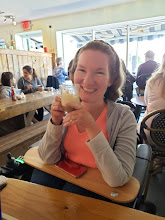"No, not wh-... Vh-! Van, not wan... Vote, not wote... Vh-!" Armed with a mirror, a diagram of the human mouth, and God-sustained patience, I was reverting back from teaching new English words to new English sounds. I have a beginner student who comes to my house, and I started using a study book with her this week. She's beginning to grasp some basic grammar, but when she read the name "Victor" as "Wictor," my mind screamed, "No no, this cannot continue! Nip this in the bud!" And so our lesson on names and vocations was put on hold for a little linguistics lesson.
Of course, we had to start with vocabulary: lip and teeth, top and bottom... then bottom lip and top teeth put together- this is where charades are handy... breathe, and you get the fh- sound, hum or speak (use your voice), and you get the vh- sound. No, the top lip doesn't move! And yes, your lip will tickle when you do it! :)
I used to be a lot more lenient with pronunciation, because many ESL students say they want to understand English, and that is more of a receiving technique (listening, reading) than giving (speaking, writing). Besides, I could understand my students just fine; being around multiple languages and dialects, my brain has just learned to auto-correct and translate what I hear. But then I started noticing that no one else could understand them, and as the students gained more grammar and vocabulary, they got frustrated that they couldn't communicate well, even with all the words that were in their brains. This is largely due to the micro-issues like distinctions between wh- and vh-, t- and th-, l- and r-, the long ee and the short i.... micro-issues that depend on micro-tools like the tongue and teeth and lips and voice, and can have huge consequences on the receiver's end.
So I've learned that it is not enough for people to simply understand and take in information; it is crucial that they are understood as well. The international people I have met and come to love have stories and knowledge and wisdom that should be shared in English. And helping them get those micro-tools to cooperate and make those micro-sounds will have a macro-impact on their lives and the lives of everyone they meet.
Words are powerful things. Pronounce them clearly. Choose them carefully. Use them to make the world a better place.
Thursday, September 27, 2012
Subscribe to:
Post Comments (Atom)





No comments:
Post a Comment